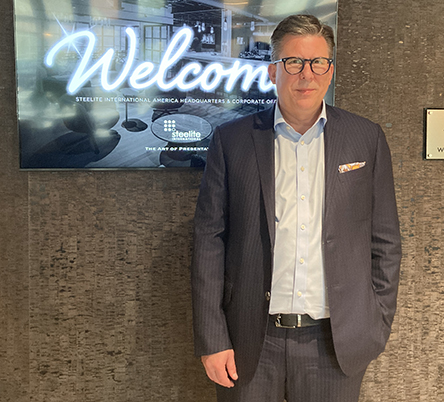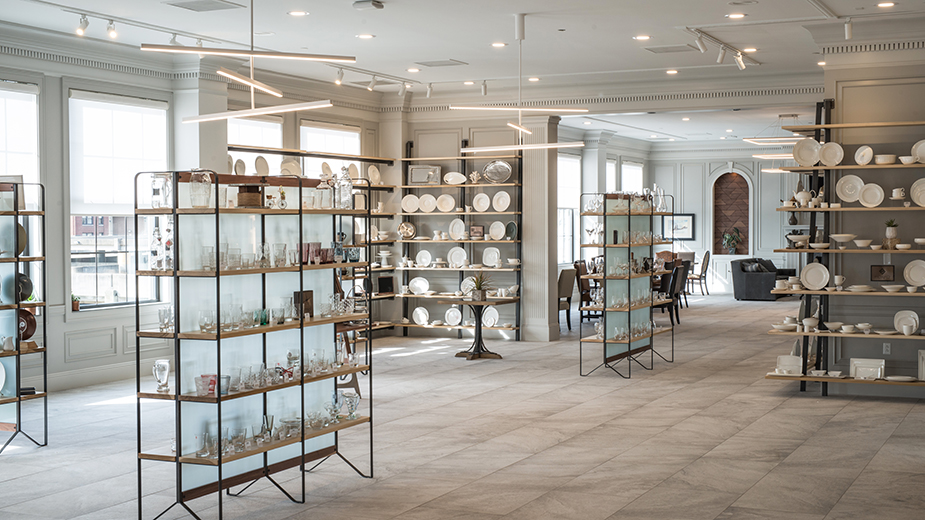YOUNGSTOWN, Ohio – Steelite International is headquartered in Youngstown but its reach is global, stretching to 143 countries.
Steelite International, a worldwide distributor of tableware for the hospitality industry, employs about 1,400.
“We trade in almost every country in Africa, most all countries in the Middle East, from large to small,” says President and CEO John Miles. “Up until the war, Russia was one of our largest export markets.”
North America is the company’s largest market, comprising 70% of its global revenue.
Like in the U.S., Steelite products are used in the restaurant and hospitality industries across the globe.
“In Africa, it’s not uncommon to see our product at a safari camp,” Miles says.
Its most popular line is Craft, a trademark line for the company. It’s an artisanal looking glaze that “tends to fit everywhere,” Miles says.
“Then after that our plain white product is always popular,” he says. “It goes everywhere.”
SOME HISTORY
The company’s global reach dates back more than a century. Steelite started in 1875 as an English company.
“England was a colonialist power for so long and had long tentacles all over the world so English companies tended to trade all over the world,” Miles says.
That laid the foundation for the global reach and its success has continued.

“I think the reason why we’ve continued to be successful in modern times is quality, innovation, service and brand recognition in our segment,” the CEO says.
Innovation is the lifeblood of any successful business, he says. People want to see aesthetics and to know that a company is modern and keeping pace with the times.
“I think if you talk to any customer, what they say makes Steelite Steelite is a consultative sales approach that builds strong, long-term relationships,” he says. “So, if someone is going to do a new hotel or a new restaurant or a new convention center and they’ve worked with us before, there’s like a 99% chance they’re going to call and say, ‘Hey, I’m doing this project. Can you help me?’”
In the United States, Steelite customers span from entry level to high end. Internationally, most of its customers range between middle and upper middle on that spectrum, Miles says. And he expects the number of countries in which the company does business to continue to grow.
“We don’t rule any country out,” he says. “We’re always looking at new markets, changing markets.”
CHALLENGES
Doing business across the world isn’t without challenges. One of those is geopolitical events and their effects.
Both Russia and Ukraine were good markets for the company. Now it does almost no business in either – Russia because of the sanctions and Ukraine because all of that country’s finances are going toward the war effort.
“I would say the advantage is the geographic diversity,” Miles says. That diversity can help through a difficult time when one market is recessed.
In its global enterprise, Steelite has approached new markets by going all in, hiring people and building a facility. It’s also worked with partners to help with understanding the nuances of the market. One such nuance is a case pack, or how many items are in a box. In Germany, that number is six. In the UK it’s 36. That can create storage issues for customers.
“So, if they get 36 and they don’t have storage for it, they’re going to want to send it back,” Miles explains.
And there are surprises. Years ago, Steelite built a business in Argentina that grew to be significant. Because of inflation though, the currency was devalued by 75% and the company lost all of its business and didn’t get paid.
But since the best economists in the world can’t reliably project currency devaluations, the company can’t prepare for them.
Duties and tariffs prove challenging, too.
Something that doesn’t get a lot of news coverage, Miles says, is the number of U.S. workers tied to imports.
“We tend to be in this political environment, very focused on U.S. manufacturing. But I think that people tend to forget how much of the economic generation in the country is from the importation of goods,” Miles says.
That might mean importing and then finishing goods. Steelite imports glasses and decorates them. The decoration tends to be worth more than the glass, so the value added is added in this country, he says.
In a May 2021 study, Trade Partnership Worldwide LLC found that imports supported more than 21 million net jobs across the country in 2018. The study lists more than 728,000 import-related jobs in Ohio and more than 827,000 import-related jobs in Pennsylvania that year.
“While no one disputes the notion that competition from imports can cost some U.S. workers their jobs, what tends to happen in the public debate is that the broader job picture is not considered,” the study authors wrote. “Yes, some workers lose jobs, and those workers matter. But at the same time other workers owe their jobs to imports, and they should figure into the public policy debate as well.”
Trade Partnership Worldwide is a trade and research firm. The 2021 study lists several sponsors including the U.S. Chamber of Commerce, the National Retail Federation and the Consumer Technology Association.
“The results may seem counterintuitive given the typical focus on how imports ‘cost’ jobs, but every $1 saved on a lower-priced piece of clothing or whatever else doesn’t just vanish,” Daniel S. Anthony, managing director of the firm, wrote in an email. “It gets spent on something else that is almost always in the United States – going out to eat, going on vacation, updating your kitchen, fixing your car – and therefore supporting other American jobs. Since those other sectors account for the vast majority of U.S. jobs and economic output, raising import costs do more harm than good economywide.”
TARIFFS
Flatware manufacturing left the United States in the 1970s for lower-cost labor markets overseas.
“Between 2016 and 2020, we had three tariff increases on knives and forks,” Miles says. “But there’s no chance that anyone is ever going to manufacture knives and forks in this country again.
“Our tariff category got caught up in the politics of steel and metal so in our own country, we had one of the most unpleasant experiences and surprises and now we, and in turn our customers, pay a lot more money because the tariffs continue to exist, [even though] there are no more U.S. jobs,” he says.
Finding workers can be difficult in Western countries but not so in Eastern countries. Vietnam is a small country geographically, for example, but it has a giant labor population.
A KNOCKOFF
A competitor in the United Arab Emirates has tried to capitalize on Steelite’s Youngstown connection. Most people in the industry come to Youngstown to go to the Steelite showroom downtown.
“We’re very much synonymous with Youngstown because we’re the only company here who does what we do here,” Miles says.
The competitor had the idea to call their products Youngstown, even naming some of its patterns for streets around the city such as Rayen and Logan. Steelite is involved in court action against the competitor.
SUSTAINABILITY
Sustainability is a big focus of Steelite, both domestically and abroad.
“I think social responsibility and sustainability are pivotal issues in business today especially in the U.K. and Europe,” Miles says. “And they’re becoming really big pivotal issues here in the U.S. very quickly as well.”
Steelite is trying to minimize its carbon footprint. The company makes its product out of clay and to make clay malleable takes a lot of water. The company recycles 100% of its water, and 100% of its glaze, clay waste and refractory.
Steelite also audits its factories for labor standards.
“We never want to be the company that’s on ‘60 Minutes,’” Miles says. “That requires a lot of time and a lot of effort and investment to make sure that you’re auditing people and processes and ensuring you’re meeting all of the social responsibilities that are out there.”

THE CULTURE
At Steelite, the culture is innovative and inclusive, and people are passionate about the products and services, the CEO says.
“In the world today, anyone could make any product anywhere,” Miles says. “We’ve got a lot of great technology, great people in the U.K., at our factory in Mexico and our factory in Syracuse, N.Y…, but I think the real thing that differentiates any business is people and culture.” And employees understand the valuable roles they play. “Everyone feels that every job is an important job and they’re a big part of the success,” Miles says. “If they don’t show up, it hurts the overall team. There’s no job at the company that’s not an important job.”
Pictured at top: Steelite International recently moved its headquarters to 255 W. Federal St. in downtown Youngstown. Photo Courtesy of Steelite International.

